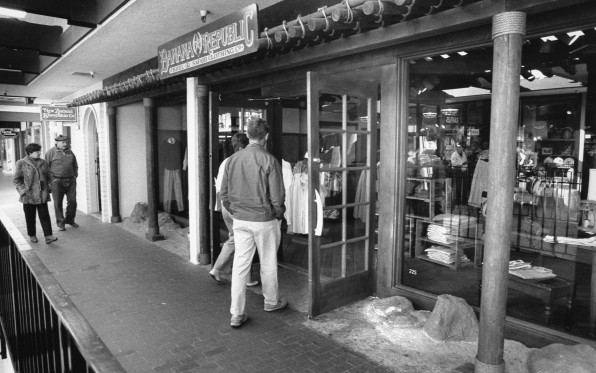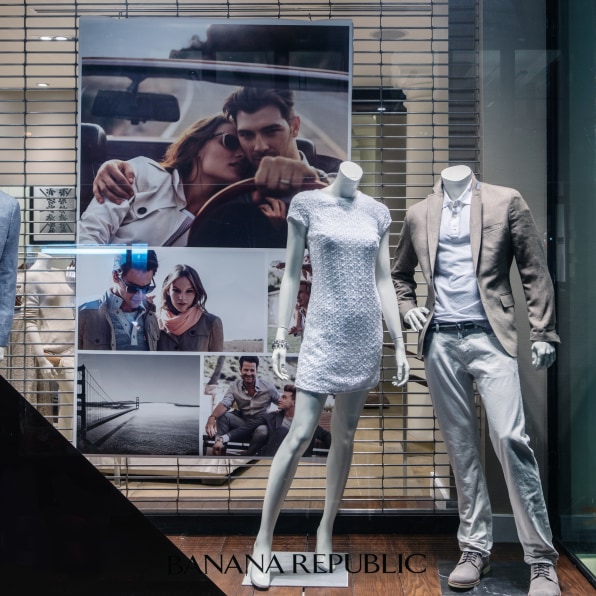Will Banana Republic ever be forced to change its name?
Republic #Republic

The last two-plus years have seen a broad reckoning for companies with racist names and logos, many of which have responded by rebranding. Aunt Jemima changed its name. The Washington Football Team changed its name. But the spotlight of consumer anger hasn’t fallen on every company. And while some that have avoided public firestorms have made changes preemptively, others seem just to be hoping the backlash doesn’t come. One in particular stands out: Banana Republic.
“Banana republic” was originally coined by the American author O. Henry in a 1904 novel to describe a fictional nation that was poor and politically unstable, inspired by his experiences living in Honduras. Over time, people began using the term to describe real countries throughout Latin America—including Guatemala and the Dominican Republic—that had precarious economies and political systems, manipulated by U.S. agricultural interests.
The word “banana” refers to the fact that fruit is a major export of these countries. And historically, U.S. corporations, such as Chiquita and United Fruit, exploited the low-paid labor in these countries to buy cheap fruit; at times, these companies even interfered with local politics, leveraging the power of the U.S. government to support coups to subvert democracy and ensure that local governments would continue to support their agricultural empires. In other words, the U.S. played a role in creating the unstable, impoverished conditions in these countries.
The term is problematic because it makes light of the damaging consequences of imperialism, and because it was originally used by white people to disparage developing countries. These days, “banana republic” is rarely used in everyday speech in reference to another country; politicians and journalists have been using it more frequently to describe the U.S. in the wake of the January 6 insurrection. But even in this context, Latin American scholars found the term offensive since it “invoked the mob violence and bloody mayhem as the usual political culture of so-called ‘banana republics’ . . . [and] draws on a century of stereotypes about Latin America created by the U.S.”
As it is a somewhat obscure historical fact, many people aren’t aware of its original meaning. Case in point: Bo Hines, a Republican nominee for Congress, who said in a recent appearance on The John Fredericks Radio Show that calling the U.S. a banana republic is “an insult to Banana Republics across the country.” He was, of course, referring to the clothing brand, for which he was widely mocked.
“This is branding at its finest,” says Marcus Collins, a marketing professor at the University of Michigan and chief strategy officer at Wieden+Kennedy. “Now, when consumers hear the words ‘banana republic,’ we no longer know the etymology of the phrase. It shows that branding has more power than education: When we hear the term, we don’t think about the historical reference, but the store.”
In the wake of the Black Lives Matter movement, when many brands had been forced to reckon with the racist origins of their names, it’s worth asking why Banana Republic—one of America’s best-known fashion labels—has yet to do so.
 A safari-themed Banana Republic, ca. 1989 [Photo: Bryan Moss/San Francisco Chronicle/Getty Images] It was about Safari Fashion
A safari-themed Banana Republic, ca. 1989 [Photo: Bryan Moss/San Francisco Chronicle/Getty Images] It was about Safari Fashion
Mel and Patricia Ziegler founded the brand in 1978, calling it the Banana Republic Travel & Safari Clothing Company. Their original vision was to sell vintage military-surplus clothing, but they pivoted to safari-style clothes—the kind of clothes a white person wore on an African safari vacation in the 1940s. The Zieglers said they wanted to create an immersive brand experience. “[W]e reinvented stores as theater and catalogs as must-read literary adventure journals,” Mel said in a 2012 Forbes interview. In practice, this meant a fantasy version of colonial Africa with jeeps in the windows, awnings that looked like tin roofs, and (resin) elephant tusks as decorations and door handles.
Of course, there aren’t safaris in the South American countries typically described as “banana republics.” The company name and aesthetic confused British colonialism in Africa with U.S. imperialism in Latin America. “The name expresses itself through the power dynamic of European countries over poor, non-European countries,” says Vann Graves, executive director of Virginia Commonwealth University’s Brandcenter.
Fashion critics point out that “safari” style is rooted in colonialism. Safari suits—featuring jackets and trousers, or skirts, with utility pockets, made of lightweight beige or khaki cotton—were the de facto uniform of British colonizers in Africa and the “badge of the ruling race,” in the words of historian Margaret MacMillan.
In 1983, Gap bought Banana Republic, and in the years that followed, it rebranded the company away from the safari theme. Its name was truncated to Banana Republic, and clothes evolved from safari wear to professional clothes, like suits and shift dresses. “From a branding standpoint, they did a good job of evolving it away from the original negative connotations, but it kept its name,” says Graves.
Then, in a strange twist, the brand returned to its roots in 2021—launching a collection of travel-inspired clothes, including pieces reminiscent of the original safari gear, like khaki suits, desert boots, and wide brimmed hats. TV ads featured models walking in a desert setting and jetting off on a vintage aircraft. The entire campaign conjured up the kind of tourism to developing countries that the Zieglers had envisaged.
When we reached out to Banana Republic about its name, the brand said it had a different interpretation of the term “banana republic” than its original. “Today, the name reflects our heritage, and while the term has multiple meanings, to us, it has always signified an imaginary, fictitious world,” says Sarah Staley, Banana Republic’s head of communications. And further, the brand sees no problem with its origins as a brand that sold safari-themed clothing. “A year ago, BR reintroduced a new brand look—nodding to its heritage while reinventing itself for today’s modern world,” Staley says.
But even when O. Henry used the term to describe a fictionalized country, it wasn’t meant as a compliment. And since he coined the term, people have used it to invoke actual countries, inhabited by Black and brown people, whose lives were most often negatively affected by Western imperialism.
 A storefront in New York City, ca. 2014 [Photo: Eugene Gologursky/Getty Images] Where’s The Pushback?
A storefront in New York City, ca. 2014 [Photo: Eugene Gologursky/Getty Images] Where’s The Pushback?
So again, with consumers having called out so many brands in the few years since George Floyd’s murder and the rise of the Black Lives Matter movement—against accusations of slavery-evocative names and logos, the food brands Aunt Jemima and Uncle Ben’s completely erased their names and branding—what is it about Banana Republic? Why no major outcry about its name?
One reason, Collins suggests, is that the people who are most likely to be offended by the term banana republic don’t feel like they have a voice. The concept originally referred to people in Central America, although it also can refer to any poor, politically unstable, and corrupt country that relies on agricultural exports. While Black and brown Americans have started feeling more empowered to speak up about racism over the last two years, immigrants from, say, Honduras and Guatemala, haven’t been as vocal. “The people most affected by this language are ignored and unseen,” Collins says. “Some are so marginalized that no one cares enough to beat the drum on their behalf.”
Graves adds that people of color are confronting racism on so many fronts in the U.S. that it can be hard to engage in yet another fight. “We’re dealing with folks targeted unfairly by law enforcement; we’re dealing with Asian hate,” he says. “There’s so much going on. It sounds horrible, but some folks just don’t think this is their fight.”
And yet, Collins and Graves—both branding experts—say that it’s only a matter of time before consumers hold Banana Republic’s feet to the fire. Many are already aware of the history of the brand’s name and origin story; others are learning about the original meaning of the term now, thanks ironically to Hines’ comments. It will take just a few consumers speaking out before the brand has a major PR problem on its hands. And this could profoundly harm the brand’s relationship with young, progressive consumers who want to be aligned with brands that share their values.
Graves believes that Banana Republic should take the lead and engage with their customers directly about its name, and how it should modify it. “Brands today are focused on building communities,” he says. “They should get out ahead of this problem and address this issue not just with people who support them, but also with their dissenters. Brands can avoid cancellation if they have a transparent conversation.”